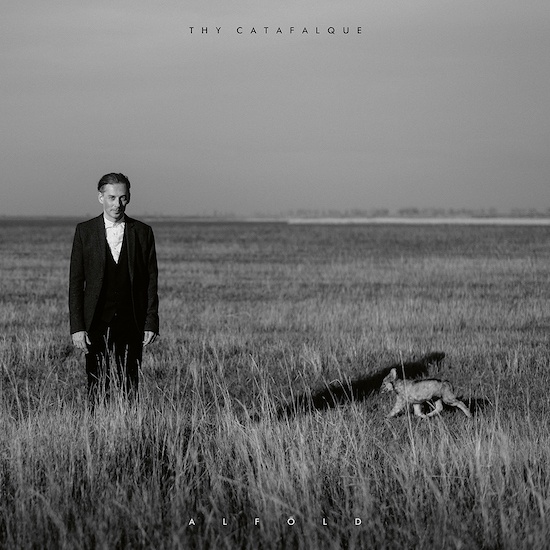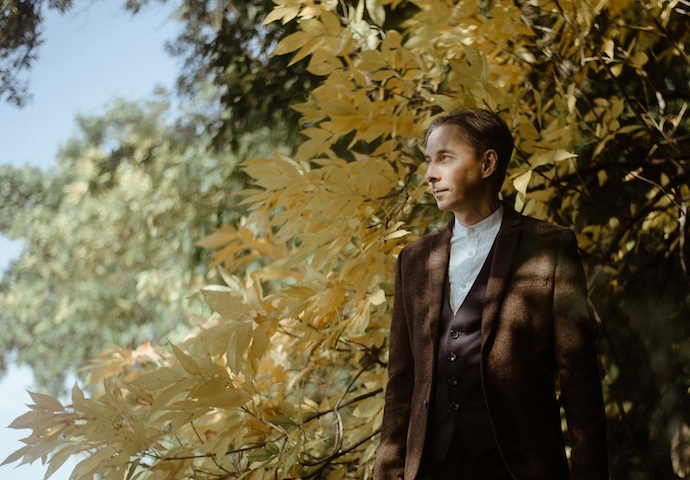
(Thy Catafalque‘s latest opus Alföld will be released by Season of Mist on June 16th, and today we present a review by our old friend and ardent Thy Catafalque student Professor D. Grover the XIIIth.)
Greetings and salutations, friends. It is once again my favorite time of year (well, my favorite time of every two or three years): Thy Catafalque season. That’s right, my favorite Hungarian multi-instrumentalist and musical genius, Tamás Kátai, has maintained his reliable release schedule and graces us once more with a new Thy Catafalque album. While the core principles of the musical project remain the same (Kátai is the sole member, supported by a sizable rotation of guest musicians lending their talents in various capacities), the Thy Catafalque sound continues to evolve, aided by a significant musical development.
If you’re a fan of the band, or happened to read my top album list from last year, then you’re likely aware that Kátai took a huge step on the past year or so by taking Thy Catafalque into a live setting for the first time. The band’s first live performance was recorded and released as a live album, and there have been a handful of other live performances since, with a shifting lineup appropriate to the band’s history. While Kátai‘s involvement in the first live show was surprisingly limited (only playing bass on a handful of songs), he has in subsequent shows taken up full bass duties, and it feels as though performing live has affected the tracks on this new Thy Catafalque album Alföld.

Photography by Orsolya Karancz
When Alföld was announced, it was described by Kátai as “the most straightforward and classic extreme metal album the project ever recorded.” While there is no mention of the impact of taking the project into a live format on this album, the tracks here feel looser, more streamlined, and well-suited to being performed live. However, this is still very much a Thy Catafalque album, and the signature elements of Kátai‘s style are all present: the distinctive synth melodies, guitar tone, and impressively programmed drums. At the risk of being repetitive, I’m going to quote myself from my review of Vadak:
“…Kátai has achieved mastery over his musical style, complete and utter mastery, and as a result he can do just about anything and make it sound very distinctively like his work. I’m convinced at this point that he could create a song based heavily on slide whistles, ukeleles, and fart noises, and I would hear it and know that it was his work…”
The sentiment still applies on Alföld, albeit in a different light than it did on Vadak. Where I previously mentioned it in a sort of more maximalist way, here Kátai takes his style in the opposite direction, stripping elements away rather than adding them. Even so, his style is immediately recognizable, and while the more experimental trappings of the previous Thy Catafalque albums have been pared back, they’re not gone entirely. While this may be more direct and straightforward than most Thy Catafalque works, it’s not as though Kátai went and recorded a Cannibal Corpse album.
With that in mind, however, it is worth noting that Alföld does feature outright death metal vocals on a couple tracks courtesy of Ahriman frontman (and former Gire bandmate) Lambert Lédeczy, who has previously guested on the Meta album as well as the live album. His presence on the album opener “A Csend Hegyei” helps to immediately set the tone for the tracks to come.

Photography by Orsolya Karancz
Still, there are also numerous moments that help to remind the listener that this is still a Thy Catafalque album. The title track is a prime example, filling its multifaceted 9+ minute runtime (the longest track on the the record by a fair bit) with death vocals, French horns, funky percussion, and the album’s sole contribution from regular Thy Catafalque contributor Martina Veronika Horváth, wrapped up with a beautiful classical guitar outro. There are also tracks like “Folyondár”, which works in not one but two flute solos, plus keyboards and violins, all sectioned off by some seriously heavy riffs. And then there’s “Szíriusz”, a short track that serves as a lead-in to the album’s closer and has some very Danny Elfman-ish synths.
Even so, this is definitely a leaner, meaner Thy Catafalque album, both in length (at 42 minutes this is definitely the shortest full-length album in the band’s discography) and in content. While this certainly feels like a conscious decision, it’s not at all out of character for a band that has consistently evolved from album to album across the breadth of its catalog. There’s nothing contrived about the shift in tone, merely a desire to do something a little different, and like pretty much every Thy Catafalque album, it works.
While I wouldn’t say that I like Alföld as much as Vadak, that’s more a credit to an album that is in serious contention for my favorite album in the band’s discography. Alföld is most definitely one of the year’s best releases and is yet another testament to the musical genius of Tamas Kátai.
https://shopusa.season-of-mist.com/band/thy-catafalque
https://orcd.co/thycatalfold
https://www.facebook.com/thycatafalque
https://www.instagram.com/thy_catafalque

Hi,
based on what Tamás said in various hungarian interviews: he stated the album was basically ready before the Mezolit concert, so the live playing did not had any influence for this album. He said, he just wanted to make something simple, and less experimental, and that’s it. 🙂